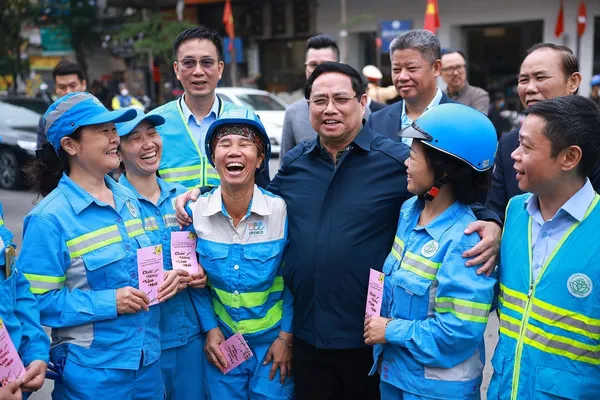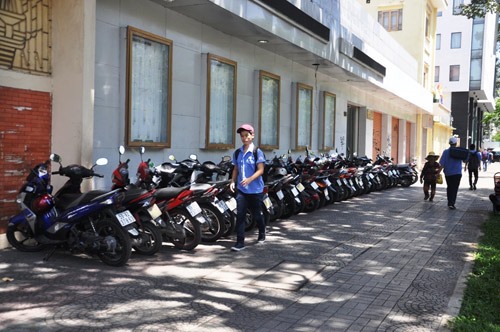 Op-Ed
Op-Ed

A much acclaimed drive to clear pavements of encroachments will not succeed in the long-term without a public culture of obeying traffic laws
 |
Vũ Thu Hà
The anomaly is obvious as soon as you arrive in any major city in Việt Nam: pavements are not primarily used by pedestrians.
They are used by motorbikes, cars and street vendors, in direct violation of the law, Article 32 of the Law on Road Traffic, to be precise.
But this has been a phenomenon for so long that having a spacious pavement to walk on has become a luxury, not a right.
This also explains why a campaign to “reclaim pavement for pedestrians” has made headlines across mainstream and social media in recent days.
The campaign, headed by HCM City District 1 Deputy Chairman Đoàn Ngọc Hải, is seeing an all-out effort to remove anything that obstructs pavements in the district, whether it is a small flower pot placed by a local household or a big construction by a State agency.
The results have been positive so far, with hundreds of illegal encroachments being removed, dozens of illegally parked vehicles and motorbike drivers driving on the pavements being penalised.
Alerted that the campaign intends to be very strict, many local residents have voluntarily put away their goods to clear the pavements.
Many residents have also rushed to the Internet to express wholehearted support for the campaign, which is now spreading to other districts in HCM City, as well as Hà Nội.
In their gushing praise for the officials’ efforts, many people have stoutly defended them from criticism that their actions were too tough and hasty. Some have even called Hải, the leader of the campaign, a ‘star’.
It is a praiseworthy effort indeed, it should not be forgotten that Hải and his team are just doing their job – implementing the law.
The rules have been there for years, and the public overexcitement reveals the sad truth that upholding the law has become an exception instead of the norm.
That said, this is not the whole picture or the whole truth. It is not just that enforcement was lax or there was widespread corruption, judgments easily made because there is some (or a lot of) truth to it.
For instance, authorities at the ward level have also launched campaigns to reclaim pavements. From time to time, we’ve seen ward authorities’ vehicles stop by the roadside, punishing violators and seizing goods from people. But the next day, when the campaign is over, everything returns to normal.
A friend who lives in the capital city’s famed Old Quarter once told me not to believe in such campaigns. She said they were just being done for the sake of doing something. It is an “unwritten law” that household businesses donate money to support the local police and ward authorities, she said.
People using the pavement to eke out a living is a worldwide phenomenon. Imagine Times Square in New York without street vendors and artists, Paris without its pavement cafes, even Hà Nội and HCM City without the early morning vegetable, fruit, tofu and sticky-rice vendors
However, the long-term solution to such problems requires that: 1. everyone follows laws clearly meant for public benefit; 2. we have a sensitive understanding of livelihood issues that many vendors and their families face, and respond accordingly; and 3. we find creative, imaginative solutions that continue the live and let live aspect of our culture.
Other aspects need to be looked at, too.
In the ongoing campaign in HCM City, it was found that even the authorities and State employees were violating the regulations.
Dozens of State-owned cars were illegally parked on pavements, and two were towed away as the drivers refused to co-operate with competent agencies; an office belonging to a ward authority covered up to half of a pavement; a redundant wall of a ministry’s branch office encroached onto a pavement; and so on.
If the State itself was breaking the law, how can we expect ordinary people to do otherwise, and how can we blame them for doing what they could to survive?
Is it understandable, then, that some people are upset? A clip recorded during the campaign showed a woman who owns an eye-glasses shop in District 1 angrily shouting at the official, refusing to be penalized for her violation. She repeatedly asked the officials why she was not told beforehand about the campaign.
She’s probably not the only one thinking thus. It’s common that many people will run a red light if a police official is absent. It’s also common that people like to complain about disorder, complete ignoring the fact that their own attitude and behaviour contributes to it.
Many pavements in our cities have to be cleared and motorbikes cannot be allowed on them, depriving pedestrians of their legitimate space: this much cannot be argued.
But clearing is only part of the solution. The people, vendors and others, need to abide by the law with full understanding, awareness and acceptance. For the long term benefit of our cities and our nation, we need to rediscover our civic sense. – VNS




